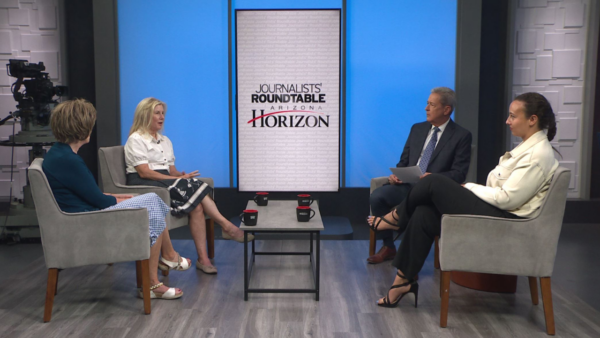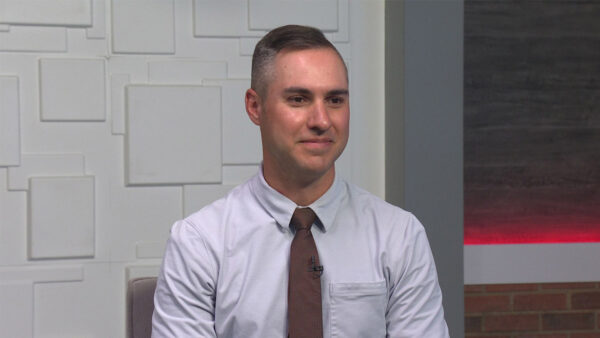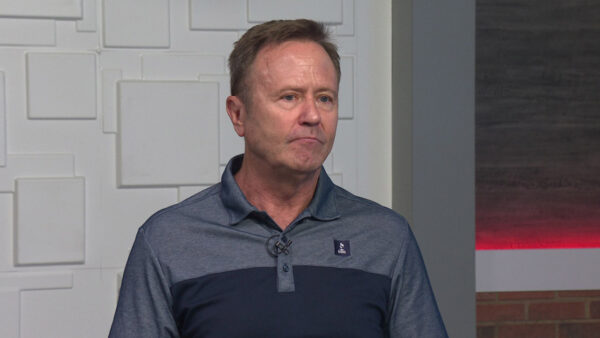Phosphorus is a key ingredient in fertilizer used to grow our food, but the supply is finite and shortages could disrupt our food chain. Arizona State University professors James Elser and Bruce Rittmann have recommended a three-part solution to this looming crisis, which involves recovering phosphorus from agricultural and human waste. Elser and Rittman will discuss their proposal.
Ted Simons: Tonight's focus on sustainability looks at the future of phosphorus, a key ingredient in fertilizer which makes it a key ingredient in food Production but scientists are concerned a dwindling supply of readily mined phosphorus represents a danger, two professors recommended a three-part solution. It involves recycling phosphours from the food system. Joining me are James Elser, a regents' professor in the school of life science, and Bruce Rittman, a regents' professor in the Biodesign Institute, and director of the Swette Center for Environmental Biotechnology. Ok, phosphorus, and real quickly, what is it?
James Elser: It is a chemical element, it's, it's added to the list of elements that, that the professor mentioned just recently. It is used in all kinds of things, especially in DNA, and nucleic acids, your body has a pound and a half, and plants use it to make their DNA, so every living thing needs it. And including crops.
Ted Simons: And it's extracted from rocks, correct?
Bruce Rittman: That's right. And almost all of the phosphorus used today in agriculture, is, is mined, mainly from Morocco, worldwide these days.
Ted Simons: And now, is there enough in Morocco and the rest of the world to keep us going or -- it sounds like there is a concern?
Bruce Rittman: There is. It's not a problem that we'll run out of phosphorus in the next year or so but what's happening is that the really high quality, high grade phosphorus is being mined out, as we move to the future we'll be forced to use lower grade phosphorus, much more expensive to mine.
Ted Simons: And I would imagine the dynamics could change greatly if phosphorus is the new oil?
James Elser: Right, so the countries that have it, they control 90% of the global phosphate rock reserves, and OPEC, which everyone is familiar with, petroleum, that's about 13 countries, controlling 75% of known reserves, so the phosphate rock market is more concentrated, if you will, so that's a matter of concern. Everything is fine now, they are a stable Government, a pretty friendly trade partner but you never know, and the question is, should we rely on the long-term stability of that or think of other ways to diversify the supply.
Ted Simons: And it sounds like you have thought of other ways to diversify it? Give us some ideas regarding the solution.
Bruce Rittman: Well, so most of the phosphorus mined is used in agriculture, but, only a small fraction of that, actually, makes it into the food that, that we eat. So, most of the, most of it is lost along the way, run off, into erosion from the land, goes into animals, and animal waste, and a certain amount of human waste, so, most of the phosphorus is, actually, lost, and this is the phosphorus that we would like to recover, and we can recycle it and create a closed loop.
Ted Simons: And when you say recycle, and again, let's start with seaweed, sewage, these things.
James Elser: Well, sewage recycling of phosphorus is getting started. There is companies out there doing that commercially now, and we're waiting wastewater treatment plants, and a company called Astar that operates out of the Casa Grande wastewater plants, so that's coming online and expanding. The big problem is animal waste, and manure. And so, I think for every pound of meat there is 100,250 pounds of manure generated in that process. And what we have done in agriculture over the last several decades, 50 or years or so is where as we have concentrated livestock Production, in certain regions of the country, and so, you cannot bring that manure back to where it needs to be in Kansas or Iowa or wherever where grains and corn or Etc. are grown, and so, there is too much manure in some places, and not enough fertilizer manure in others, so, that recycling loop has been broken. It used to operate on, on, you know, the family farm, it used to have a live mixture, and crops.
Ted Simons: Can that recycling loop be repaired if you find a way? I know run-off is a big concern here with algae and the whole nine yards. If you find a way to control the run-off and control the cattle, itself, that sounds like a closed system, doesn't it?
Bruce Rittman: It is, and the solution for cattle and pigs and other, other animals, is much closer at hand. One of the big advantages with those streams that they are concentrated, so, we have the materials in one place, and we can capture the, the phosphorus, and also, by the way, capture a lot of renewable energy at the same time. And then we want to make a concentrated, high quality stream of phosphorus to return back to agriculture. The erosion is much more challenging. It's diffused, and we can make major progress but it's more difficult.
Ted Simons: But, is that where it's way out there in the future?
James Elser: Probably, it's, it's -- we've been working on soil erosion for a long time, and we have to take better care of agricultural soils and, and all kinds of things are being implemented. Difference practices, and Etc., are being developing to get better ways of thinking about how to treat the soil better to maintain the quality, so that we don't lose phosphorus in that way, so that's the one thing, but it's challenging, and the recycling pathways, we discussed, the second aspect, and we think that that's faster, we'll get there sooner. And the other thing that would, good, and the other thing that, besides manure is to recycle from food waste. About 30 to 50% of food is wasted before, between Production and consumption, both in the developed world and in the developing world. And that waste, usually, doesn't go back. The phosphorus doesn't go back to the field but to a landfill or somewhere else. So, we need technologies that can also operate on food waste.
Ted Simons: And speaking of food, I noticed reducing the consumption of meat in and of itself. Is a solution, is a plan.
Bruce Rittman: Yes, of course. Because, there is a large amount of green that has to be grown to feed the animals, to grow the animals. And of course, only a small amount of the, of the, of that ends up in the animals that we eat, so we end up processing a tremendous amount of, of agricultural material, and the fertilizer that goes on the field. So this would be a way to reduce the demand for phosphorus.
Ted Simons: How far can all these -- how far can they go?
Bruce Rittman: Well, we think that, that, if you took a staged approach on this. We could probably reap cycle about 90% of the phosphorus being lost, on this and not only would this recycle the phosphorus, which would be a great benefit to our agricultural system, but it would also be capturing a lot of water pollution that's just going off in the erosion and also with the animal waste. So, we would be getting a double benefit for the sustainability of agriculture and the environment.
Ted Simons: And the expense of capturing, close to 90%, what kind of cost says are involved here?
James Elser: There is going to be a long process of technology development, innovation, and that needs to be put in place, you know, so, some of Bruce's work and others around ASU and other universities, are bringing these technologies, and they involve bioreactors, and microbes going to grind up this, this food waste, for example, or manure on the farm, and in the process, produce bioenergy sources and then a concentrated solution of nitrogen and phosphorus that can be pulled out and brought into recycling. We sort of see a whole new job sector or industrial sector born once this recycling is in place, sort in food districts and towns. They will be, there will be things out in the neighborhood, or down the street where people put food waste, for example, and someone will have to tend to all of that and keep it running.
Ted Simons: And with that in mind, is this issue, do you think, is it starting to inch above the radar a bit? Are folks paying attention out there?
Bruce Rittman: Well, we're paying attention out there and we have a whole network of people around the world who are paying attention, and ASU is the leader in what's known as a research collaboration network on phosphorus, so, we found people around the world who are interested and, and clearly, in the popular realm it needs to be elevated further, but, there is a lot of interest.
Ted Simons: How do you do that and elevate this in the popular realm?
James Elser: I don't know. Come on shows, I guess. We have pins here, pins, p for people, and we can give you one later. So, I don't know. We are going to have to communicate all this, and I think people will recognize, municipalities. Less wastewater, less waste streams coming into the landfills. Cleaner water. More jobs for people. Seems to me like a good idea.
Ted Simons: And really, before you go, again, I noticed in your report about this, that you have like two different futures here if this issue is not addressed. The first future, if it's not addressed looks like it's pretty clamorous stuff.
James Elser: Yes, so if we don't implement the, the recycling pathways, we're going to have food riots, and contesting over that, and bad water quality, so it seems like those are two futures we can choose from.
Ted Simons: Good to have you here, and thanks for joining us.
James Elser:Professor, Arizona State University; Bruce Rittmann:Professor, Arizona State University;























